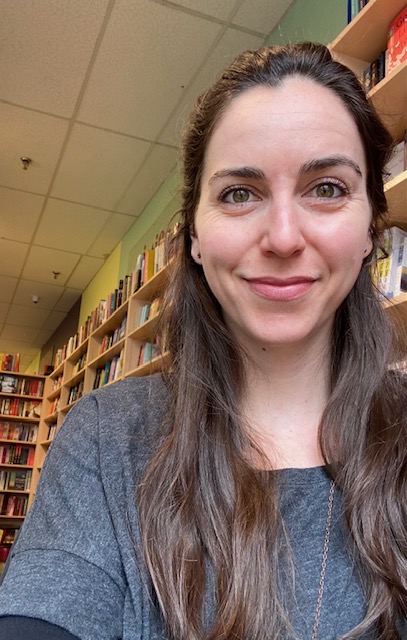This semester, the College of William and Mary’s creative writing faculty gained its newest member: associate professor Caitlin McGill.
McGill, currently based in Richmond, arrived at the College after spending nearly a decade in Boston where she primarily taught creative writing courses at Emerson College. While in Boston, she was also heavily involved in Writers Without Margins, a local organization that hosts free creative writing workshops for different, often underserved communities who may not have access to the academic spaces in which creative writing is traditionally taught.
Held in places such as a day shelter, public library and a men’s post-incarceration and addiction recovery center, these workshops gave attendees a safe space to complete writing exercises, share their writing and discuss other pieces of writing that McGill would bring to the workshop. In addition to facilitating workshops, McGill and other leaders would often provide other resources such as typing up or making copies of members’ writing if they were unable to do so themselves.
Writers Without Margins would also publish an annual journal that compiled all the writing done by writers during the workshops. Free copies of the journal were then distributed to anyone involved with the organization.
“That’s a really memorable moment when we get to celebrate the work that the writers have done, and they get to see their work published in print,” McGill said.
Though McGill says there was increased pressure during Writers Without Margins workshops due to the personal struggles many of the attendees were experiencing, these raised stakes are also what made the experience especially rewarding when she saw firsthand the positive impact the workshops had on people’s day-to-day lives. To this day, McGill recounts her experience in Writers Without Margins to be one of the most impactful aspects of her time in Boston and her journey as a writer.
“It’s a particular balance to strike between making space for people to tell their stories and also making sure other people in the room are doing okay, which is why we have community norms and all that stuff,” McGill said. “But I think it’s really powerful to be able to witness people’s stories and to help them tell their stories.”
Now, as an educator at the College, McGill continues to encourage others to find their voices through writing and express their honest, authentic selves.
“I think that when we are open to discovery in our writing, we can often find the most interesting and authentic spaces,” McGill said. “I also feel like I really try to be my whole, authentic self with students, and building those relationships with students and creating community in the classroom and being authentic—it feels like the core of [my teaching].”
McGill currently teaches several creative writing classes primarily in nonfiction and poetry and plans to introduce a new course next spring titled “Imagining the Gaps in Nonfiction.” According to McGill, the course explores what is left unsaid and memories that may have been suppressed or forgotten, leaving behind gaps.
“Sometimes the gaps are there because there’s been a family need or habit to be silent about a story, or perhaps society has silenced their stories or even erased them from the archives, or memory is simply fallible, and we can’t remember everything from the past,” McGill said. “…So ‘Imagining the Gaps in Nonfiction’ allows us to resist the silence and still tell our stories, even if we can’t remember, even if we don’t have all the facts or even if someone else sort of [tries] to erase our story. It’s a way to push against that erasure.”
This theme of resisting silence is one that traces throughout McGill’s work, such as her personal memoir, which she is currently in the process of finalizing. Her Miami-based memoir, “When They Wondered Where I Went,” retells her experience escaping a six-year abusive relationship with an “intensely alluring” and “drug-addled” 22-year-old that began at the age of 16, according to her website.
“[My memoir] is a coming-of-age story about being silenced for many years as a young person and…getting out of an abusive situation and then also coming to see over many, many years the truth of what had happened,” McGill said. “It’s thematically about resisting those silences and about the human desire to believe in the unseen and how that desire, paired with abuse and silencing, was the perfect storm, if you will, of what made it impossible to see the truth of what was happening.”
McGill’s memoir first began as a collection of essays that she had no intention of turning into a book, she says, and it was only after years of writing into uncertainty that she was able to piece together her own story and reclaim her memories.
“I started writing this book without knowing that I was writing a book,” McGill said. “I had no idea I even had a story to tell. I had no idea that I had been silenced out of telling this story. And it was through the act of writing — and of course, taking care of myself with mental health resources — that I started to see the story.”
The piecemeal process through which McGill discovered and came to terms with her story exemplifies the nonlinear, messy ways in which memories resurface, she says. One of the most difficult parts in putting together this memoir was figuring out the best way to tell her story because she says she was telling her story “out of order” for the longest time.
“I definitely struggled over the years to figure out, how do I honor and preserve the manner in which I remembered this and the sort of fragmented, non-linear nature of it while also crafting a story that readers can follow?” McGill said. “And that’s a balance that’s hard to find for a lot of writers. How do we keep our authentic, instinctual style and voice without [losing it] when we cater to an audience?”
Another challenge that McGill says she — and other female and marginalized writers — often face is earning proper recognition for the art, technique and craft of their writing as readers tend to focus more on the content of their memoirs rather than the labor that these writers pour into meticulously building each sentence and scene.
“I know a lot of women writers who write about their lives and get asked more about the content of their story more than the art and that can be frustrating for them,” McGill said. “I think that we are artists who are working really hard technically, and so sometimes we want to emphasize the hard, technical work that we do without erasing the power of telling our own stories.”
As she now wraps up her first book and prepares to send it off to publishers, McGill says she will turn her attention to writing about other themes that are deeply personal for her. In terms of her next major project, she plans to write about topics such as food and sexuality.
“I’m imagining the next book being an essay collection about desire in terms of food, sexuality, particularly bisexuality, and how we see ourselves through external lenses and what happens when we try to remove those,” McGill said. “How do we kind of understand our hungers and our desires if we try our best to think of them through our authentic inner voices? If we try to clear the external noise, what’s there? And how does society often influence or dictate our desires?”
Though difficult, this process of interrogating her past and her identity through writing is not one that McGill plans to pause any time soon.
“By writing about my past, I come to know myself better, and I think when we come to know ourselves better, in some ways, we become more free in the present,” McGill said.




































